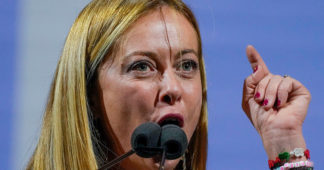By Ramzy Baroud*
Oct 01, 2025
Regardless of where the pendulum of history will swing, there is no denying that what is happening in Italy at the moment is no less than an actual political uprising, an Intifada.
What is happening in Italy regarding Gaza is unprecedented in the history of solidarity between the country and any other international cause anywhere. A popular uprising is underway, the consequences of which are likely to alter, not only Rome’s position on the Israeli genocide in the Strip, but the country’s own political structure altogether.
To understand why such a conclusion is a rational one, we must consider two important factors: the popular mobilization throughout the country and the historical context of Italy’s political attitude towards Palestine and the Middle East.
When the Israeli genocide in Gaza started, the language and political posturing of the far-right government of Giorgia Meloni were more or less consistent with the political positions adopted by other European leaders.
In her visit to Israel on October 21, 2023, Meloni’s language was that of unconditional condemnation of Palestinians for the October 7 attack and equally unconditional support of Israel and its ‘right to defend itself’.
That position remained consistent throughout the war until a few months ago, when the Israeli genocide reached levels too extreme even for Meloni to ignore. This was expressed in the words of Italian Defense Minister Guido Crosetto, who stated, last August, that Israel “lost its sanity and humanity.”
Despite this, Italian weapons continued to flow into Israel. Even when Rome decided not to ship new weapons to Tel Aviv, old military contracts previously signed with the Italian arms giant Leonardo were still being honored, despite the fact that these weapons were used directly in the Israeli genocide in Gaza.
Not only did Meloni ‘honor’ the country’s commitment to Israel at the expense of hundreds of thousands of innocent Palestinians in Gaza, but also at the expense of Italy’s progressive constitution, which states that “Italy rejects war as an instrument of aggression against the freedom of other peoples”.
On the other side, Italian society, at least for a while, remained confused and apparently docile in the face of the Israeli crimes and the support of their government for the ongoing genocide.
Their apparent docility did not necessarily reflect the Italian people’s lack of interest in events outside of their borders. Instead, it was a reflection of three major political and historical factors that are worth noting:
One, Italian media has, as of late, been divided into two main groups: private media, owned largely by the family of the late Prime Minister Silvio Berlusconi – a far-right media mogul and close ally of Israeli Prime Minister Benjamin Netanyahu; and public media, beholden to the diktats of the government. Expectedly, both remained committed to the Israeli hasbara line that criminalized the Palestinians and absolved Israel.
Two, the lack of organizational platforms in Italy, which in the past have been positioned within the activities of popular-based unions. Historically, Italy’s powerful unions were directly linked to political parties that had substantial representation in the Italian parliament. Together, they have managed not only to pull political strings but even to influence policies, nationally and internationally.
Three, all of the above is related to the major repositioning of Italian politics between the post-WWII First Republic (1948-1992) and the Second Republic, from 1992 to the present. That major realignment was directly related to the collapse of the Soviet Union, the dismantling of Italy’s communist party – once the West’s most powerful and relevant communist party – and the rise of center-right politics.
The latter event not only forced a dramatic change in Italy’s domestic politics, but also its foreign policy’s attitude, thus moving away from the far more balanced position regarding the Israeli occupation of Palestine, for example, to the near embrace of Israel’s most far-right politicians in later years.
This embrace became most apparent during the years of Berlusconi, but even more accentuated in Matteo Salvini’s Lega party, known even among Italians for being the natural inheritor of Italy’s fascist legacy.
But things began changing, thanks to the extent of Israel’s criminality in Gaza, the rising global solidarity for Palestine and the elaborate grassroots mobilization within Italy itself since the start of the genocide.
On September 22, Italian dockworkers led a nationwide strike against the war on Gaza and arms shipments to Israel. The action drew on a long history of worker resistance to militarization, especially in ports repeatedly used to transport weapons. Organized by grassroots unions and solidarity networks, the mobilization underscored a broad refusal among workers to be complicit in government policies that sustain war and genocide.
Suddenly, Italian unions are back on the streets, not simply to negotiate better wages, but to reclaim their position as a vanguard of solidarity at home and abroad. The consequences of this event alone could usher in a major change in the political attitude of the Italian people.
As Meloni’s government refuses to recognize the state of Palestine, she positions herself in direct opposition to the aspirations of her own people, from all political and ideological backgrounds. This could cost her dearly in future elections.
Italy is now on the cusp of another historical moment, the outcome of which could either entrench the country further in the far-right camp or take it back to a position that is far more consistent with its radical history of anti-fascism, social mobilization, and internationalist resistance.
Regardless of where the pendulum of history will swing, there is no denying that what is happening in Italy at the moment is no less than an actual political uprising, an Intifada.
* Dr. Ramzy Baroud is a journalist, author and the Editor of The Palestine Chronicle. He is the author of six books. His forthcoming book, ‘Before the Flood,’ will be published by Seven Stories Press. His other books include ‘Our Vision for Liberation’, ‘My Father was a Freedom Fighter’ and ‘The Last Earth’. Baroud is a Non-resident Senior Research Fellow at the Center for Islam and Global Affairs (CIGA). His website is www.ramzybaroud.net
We remind our readers that publication of articles on our site does not mean that we agree with what is written. Our policy is to publish anything which we consider of interest, so as to assist our readers in forming their opinions. Sometimes we even publish articles with which we totally disagree, since we believe it is important for our readers to be informed on as wide a spectrum of views as possible.











